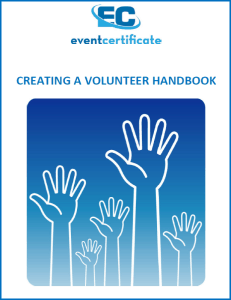Volunteers or Paid Staff?
If you’re not a large organization with an abundance of funding to support paid event staff, volunteers will no doubt be a crucial part of your event organization process. Volunteers are great for getting the assistance you need to coordinate events, promote your event and business, while allowing volunteers to connect with the mission of your company and gain on the job skills and experience. There are many organizations that would just not exist or be able to deliver the breathe of programs and services they do without the assistance of volunteers.
It is however important to ensure that your company creates, supports and maintains healthy relationships with its volunteers. Let’s face it, not all volunteers are created equal and it will be your responsibility to evaluate when volunteers are not effective and find a solution.
[bctt tweet=”An ineffective event volunteer creates twice as much work for an Event Manager. #eventprofs”]
Ending volunteer relationships can be difficult as people often assume because a volunteer is not being paid that they do not have the same power to sever that tie as they would with a paid employee – This could not be further from the truth. While these individuals are donating their time to your organization, you will need to assess the overall impact they could be having on your business. For example, an Event volunteer that is unproductive could influence the moral of your other volunteers. This volunteer will also not be completing the tasks assigned and will create additional work for your team. This person could also be interacting with your clients and event attendees while representing your brand, projecting an image that could be damaging to your business reputation.
Before you fire an event volunteer be sure you have taken the following steps:
- Create clear, specific job descriptions for volunteer positions. With a clearly outlined job descriptions volunteers will be aware of the expectations prior to starting the job. This will ensure that both you and your volunteer also have a point of reference if there are ever any doubts about roles and responsibilities.
- Provide volunteers with a Handbook/ Manual. This is a document that will outline for the volunteer information about your business, the event (s), your internal processes, resources they can refer to as needed, tools they need for the job, a volunteer agreement and a list of contacts within your company. Download our free volunteer handbook writing guide for your reference.
- Host a volunteer orientation and training session. Providing volunteers with their job descriptions and a guide to your event will not be enough. Meet with your volunteers to welcome them to your team and provide them with an opportunity to ask questions. You will also need to host a training session (or multiple) to provide them with the tools they need to succeed. Show your volunteers what needs to be completed. Walk them through a simulated event if you can, this will give them the most realistic example of what is to be
- expected during an event so there are no surprises.

- Address performance issues immediately in a one-on-one meeting. If after providing a volunteer with the tools and resources they need to complete the job you are still encountering problems, meet with your volunteer and address the issue right away. Here you can bring with you a copy of the volunteer’s job description and explain what your expectations are and what is currently being delivered. The volunteer may agree to address the issue or bring to your attention another problem that is affecting their performance. You should also use this meeting to outline next steps with your volunteer. Start with a positive statement, followed by the problem, and close with the consequence. For example: “I really enjoy having you as a part of our team, however if you continue to arrive at events an hour after you are scheduled, I will have to schedule another volunteer to take over your duties going forward.”
- Develop a system for firing volunteers. Having a system in place will provide you and your team with a defined step of actions for handling issues with volunteers. Your system should include communication of expectations, investigation of the problem, documentation of any issues and finally the termination meeting. When you meet with volunteers to discuss performance issues, always make a note of what was discussed, this will be your reference for the volunteer, for showcasing improvement and also protects your company against any legal issues.
- The firing meeting. Regardless of the reason you will need to meet with your volunteer to end the relationship with your company. It is crucial that you are specific – explain exactly what the problems were and the steps that were taken to resolve them, do not negotiate – state your decision simply and professionally, this is not a coaching opportunity, and finally follow up with a written confirmation. For Example:
Dear Volunteer,
Thank you for your interest and involvement in the ABC event and the time you spent volunteering as a Registration Assistant. Your outgoing personality and passion about our company was a real asset to us.
We are so disappointed that your schedule did not allow you to keep the requirements of the position, as outlined in our volunteer handbook. As mentioned in our meeting on September 26, 2018, we need to seek a replacement for your position and terminate our letter of agreement.
I trust that when your schedule changes and you feel that you can meet the requirements of this position, we can once again have you be a part of our volunteer team.
Sincerely,
Jody-Ann
Event Manager

Firing a volunteer is difficult. Unfortunately if a volunteer is not fulfilling their commitments, to ensure the success of your event and avoid any negative impact on your business or clients this is unavoidable.
Have you ever had to fire a volunteer?




